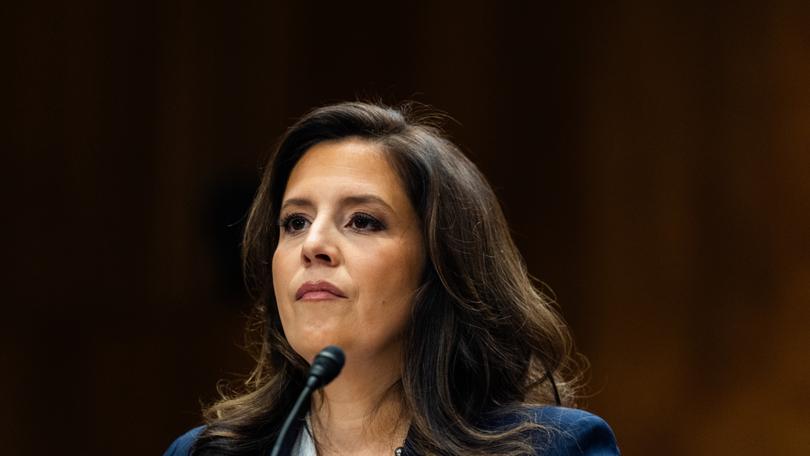Trump’s ambassador nominee questions US funding of ‘antisemitic’ UN
President Donald Trump’s nominee for ambassador to the United Nations said the US would determine whether to continue funding UN agencies that are ‘antisemitic or engaging in fraud, corruption or terrorism’.

President Donald Trump’s nominee for ambassador to the United Nations promised on Tuesday to push to align the global body more closely with U.S. interests and to determine whether to continue funding U.N. agencies that are “antisemitic or engaging in fraud, corruption or terrorism.”
“We must drive reform,” Rep. Elise Stefanik (R-New York) told the Senate Foreign Relations Committee at a confirmation hearing. “The U.N. has not lived up to [its] founding mission, and we must demand better,” she said. “It is imperative to ensure strong American leadership.”
Republican supporters on the committee decried what they said were Chinese attempts to block American influence in the international body and unfair U.N. treatment of Israel.
Sign up to The Nightly's newsletters.
Get the first look at the digital newspaper, curated daily stories and breaking headlines delivered to your inbox.
By continuing you agree to our Terms and Privacy Policy.In response, Stefanik repeatedly denounced what she said was “the antisemitic rot that is pervasive within the U.N. system.”
Majorities in both the U.N. General Assembly - where all 193 U.N. member states are represented - and the 15-member Security Council have proposed numerous resolutions over many years denouncing Israeli actions related to its occupation of Palestinian territories in the West Bank and Gaza and supporting a right of Palestinians to their own state. Assembly resolutions are expressions of member opinion, while Security Council resolutions have the force of international law. Most council resolutions criticizing Israel have failed over the years because of a U.S. veto.
Stefanik told senators weighing her nomination that she agreed with extremist members of Israeli Prime Minister Benjamin Netanyahu’s government that Israel has a “biblical right” to the entire West Bank, responding “yes” when asked whether she “subscribed to the views” of Netanyahu’s far-right finance minister, Bezalel Smotrich, and former national security minister Itamar Ben Gvir supporting annexation.
During his first term, Trump proposed a peace plan that would have legalized all existing Israeli settlements in the West Bank and ceded about 30 percent of its territory to Israel. But after objections by Saudi Arabia, with which Trump was seeking an expanded diplomatic relationship for both the United States and Israel, he did not pursue those actions.
Since then, Trump has said little about the issue, although he lifted sanctions imposed by President Joe Biden against extremist West Bank settlers as one of the first executive actions following Monday’s inauguration.
Stefanik also said that “pushing back on Iran is a top priority.” Repeating claims made by Trump during his presidential campaign, she said that U.S. policy during his first term - including withdrawal from the 2015 nuclear agreement forged by the United States, its main European allies, Russia and China, as well as the imposition of “maximum pressure” sanctions - was “a success” in stemming Iran’s nuclear program and decimating its economy.
Since the effective collapse of the deal, Iran has expanded its nuclear program. Stefanik told senators that an “emboldened Iran … led to directly the October 7th terrorist attack against Israel” conducted by Hamas with the backing of Iran and its regional proxies.
Trump has not yet spelled out whether his policy toward Iran will focus on diplomacy, more sanctions or military action. But Stefanik and Marco Rubio, sworn in Tuesday as Trump’s secretary of state, have said they favored “snapback” sanctions, a provision under the nuclear deal that allowed signatories to return to harsh restrictions on Iran if it violated the terms of the original agreement. That provision expires in October. Any signer of the deal can invoke snapback, but the Europeans opposed Trump’s first-term effort to do it on grounds the United States had withdrawn from the deal and had no standing.
The United Nations includes scores of subject-specific organizations, from civil aviation to peacekeeping. Within hours of his inauguration Monday, Trump withdrew U.S. membership and funding for the World Health Organization, which he said was controlled by China, and the Paris climate accord, repeating actions from his first term that were subsequently overturned by Biden. He also reaffirmed Biden’s withdrawal of funding for UNRWA, the main Palestinian aid organization in Gaza and the West Bank.
Israel has accused UNRWA of systematic support for terrorism and has passed laws that will prohibit it from operating within Israel after this month. The United Nations, meanwhile, says that Israel’s war against Hamas militants in the Gaza Strip has killed more than 260 UNRWA employees and says it has not found enough evidence to support more than a small handful of Israeli accusations among its 13,000 employees in Gaza.
While some countries suspended funding to UNRWA following Israel’s claims of complicity with Hamas, most have since restored that support. Stefanik voiced support for certain U.N. agencies, including the World Food Program and UNICEF, which helps children, but said that UNRWA would be at the “bottom of the list.” During the hearing, Sen. Chris Van Hollen (D-Maryland) questioned U.S. withholding of funding and urged critics of UNRWA to read the U.S. intelligence agencies’ assessment of the aid group.
Stefanik was also critical of UNIFIL, the U.N. peacekeeping force in Lebanon, which she said had “not met its mission” of preventing Iran-backed Hezbollah from marshaling forces in southern Lebanon to attack Israel.
The United States has long been the largest benefactor to virtually every part of the U.N. system, as dues are automatically determined by the size of a member state’s economy. Washington also makes additional contributions - totaling in the billions of dollars - to a number of U.N. agencies. All of that funding will now be reviewed on a case-by-case basis, Stefanik said, adding that she “would support tailored cuts” to specific U.N. agencies.
© 2025 , The Washington Post
